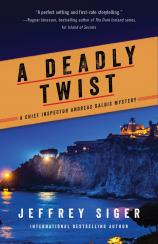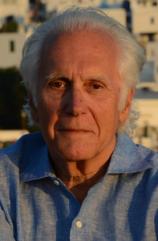Interview: April 15, 2021
A DEADLY TWIST is a twisting tale of greed, corruption and murder that puts Chief Inspector Andreas Kaldis, his family and members of his team in the path of a ruthless killer who will stop at nothing to keep dark secrets buried --- forever. In this interview conducted by Michael Barson, Senior Publicity Executive at Melville House, Jeffrey Siger describes the most distinctive elements of the island of Naxos, which is the setting for his 11th book featuring Kaldis. He also talks about his uncanny ability to predict crises that are addressed in his novels a year or two before they become harsh realities, and the one character in the series whose growth has even taken him by surprise.
Question: In the 10 preceding novels in the Inspector Andreas Kaldis series, you’ve set the action on the isles of Mykonos, Patmos, Tinos, Santorini and Lesvos, plus the legendary settings of Dełphi and Sparta. Now we find ourselves in Naxos. What are the most distinctive elements of that island?
Jeffrey Siger: For history buffs, Cycladic life began on Naxos before Minoan Crete and Mycenaean Greece, and flourished as a society through most of antiquity up until the Persians ended its long independent run. Then came the Athenians, Spartans and a string of other Greeks, followed by the Romans, Venetians, Turks and a touch of Russians, though the most lasting influence is clearly Venetian. A 13th-century Venetian castle still dominates the hilltop overlooking the ancient harbor and capital town of Naxos --- called Chora by the locals.
Naxos is the greenest and largest island in the Cyclades --- four times the size of its neighbor Mykonos --- and boasts the Cyclades' two largest mountains. It is where Zeus was raised, Ares took refuge and Dionysius called home.
The island is agriculturally blessed --- deep into its seventh millennium of cultivation --- and, since antiquity, famous for its marble and emery mines. Down in its valleys, rows of olive sweep up against fields of copper, emerald and sage, while stone walls streaked with age hold planted terraces snugly in place against sharply slanted hillsides. Once up in the mountains, roads turn to twists, switchbacks and panoramic views of long fertile valleys, slices of a distant deep blue sea, and vast stretches of sandy beaches.
Naxos presents a many-faceted setting for a mystery/thriller. It is filled with scores of villages deeply proud of their individual histories, and a population forced to confront how best to preserve its past in balance with the demands of tourism hungry to capitalize on the beauty of Naxos' landscape and the seductive magic of its ways.
Q: When your first novel in the series, MURDER IN MYKONOS, was published in 2008, did you ever envision yourself embarking on a third decade with the Andreas Kaldis series?
JS: Back when I started writing about Andreas Kaldis, I didn’t intend on becoming a chronicler of Greece’s trials and tribulations. My original goal was to write a stand-alone novel telling the story of an island I knew intimately. I wanted to talk about its people, culture, history and politics, and only settled upon the mystery format because it struck me as the best vehicle for a tell-it-like-it-is exploration of how a tourist island society might respond to a threat to its newfound economic glory.
When that book, MURDER IN MYKONOS, became Greece’s #1 bestselling English language novel and hit the New York Times “radar list” of bestselling hardcovers, I figured I better stick with my characters, because a lot of people liked them. Of course, I liked them too --- particularly the easy way that serious issues, political and otherwise, could be expressed around them. So I wrote another, and then another, each novel naturally gravitating toward exploring a different aspect of Greek society. Before I knew it, I found myself immersed in creating a collage of what Greece was all about --- while never forgetting that my prime directive is to write fast-paced, tell-it-like-it-is mystery/thrillers that also entertain.
Q: Each Chief Inspector Kaldis crime novel is distinctive, because each deals with a different social crisis that the Greek people are now facing. In fact, at times you have actually predicted a crisis a year or two before it became harsh reality. Does that make you the Cassandra of the mystery world?
JS: It’s downright freaky how often my significant plot points come to pass in real life. Something on that order has happened in virtually every book in the series, be it about Greeks vis-à-vis their government, church, families, military, financial crises, refugees, criminal enterprises or tourism. Two of the more incredible coincidences (predictions?) to me are (1) a political villain described in detail in my second book, ASSASSINS OF ATHENS, years later emerged in real life as Prime Minister of Greece, and (2) in the first scene of my 10th book, THE MYKONOS MOB, I describe the assassination in an Athens suburb of a man involved in the Mykonos security, nightlife and drug trades, all of which later happened in real life --- and in both the factual and fictional versions, the victim drove a Mercedes and his assassin was Bulgarian.
To be honest, my editor first called me Cassandra. Perhaps I ought to more seriously consider how that predictor of the future ended up.
Q: The members of Inspector Kaldis’ squad are wonderfully drawn, a latter-day version of Ed McBain’s iconic 87th Precinct police department. Since the advent of the series, is there one character whose growth has taken even you by surprise?
JS: It's great praise to be compared to Ed McBain, and I treasure the ensemble cast that has drawn me into their circle and allowed me to chronicle their exploits. I say that with all sincerity for I feel as if my characters are doing the heavy lifting. I just follow along behind noting their progress. No book is more expressive of that ensemble cast than A DEADLY TWIST. So of all the characters who play a part in my work, the one who has surprised me the most, is Andreas Kaldis’ secretary/administrative assistant, Maggie. She plays a generally small but significant part in each novel, yet has an enthusiastic fan base. Maybe the time has come to give her a much bigger role.
Q: You’ve spent over 30 years living part of each year in Greece, which accounts for the uncanny verisimilitude of the books. But is there a chance that you might one day run out of territory to write about?
JS: Thank you for that hundred-dollar word, but for any who may wonder if I’ll ever exhaust matters to explore, have no fear. There are far too many issues confronting the complex civilization that is Greece for me to run out of things to write about any time soon. After all, Greece is the birthplace of the gods, the cradle of European civilization, the bridge between East and West. Spartan courage, Athenian democracy, Olympic achievement and Trojan intrigue all call it home.
For those who may wonder what any of that has to do with our modern world, I say, “Look at a map,” because what tantalizes me as a writer working on the edge of societal change is how many of the great issues confronting the modern world are centered in Greece’s Mediterranean neighborhood. Indeed, I’d venture to say no western country is closer to what challenges our planet than Greece.
Q: If you could take along the work of three crime writers with you to the proverbial desert isle for a year, which authors would you select?
JS: Lest I lose every living mystery writer friend I have, permit to me to suggest this mix: Sir Arthur Conan Doyle, Tom Clancy, Robert B. Parker.




